

How To Focus Better: Manage Your Attention (Not Your Time) How many minutes of undisturbed work do you get done on an average day?
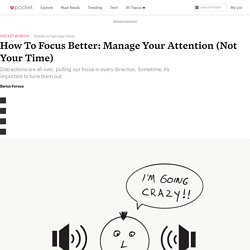
Ten, 20, maybe 50 minutes? If you think that sounds low, just examine your life. Most of us can’t go undisturbed for more than 10 minutes. We’re all so connected that it becomes impossible to find time to focus on yourself and your work. Some of us get hundreds of notifications and messages per day. You find yourself answering a Whatsapp message here, an email there, talk to a friend, and then talk to a colleague on Slack.
In a way, you’re held captive by others. How To Focus Better: Manage Your Attention (Not Your Time) 'I feel bombarded with to-dos': the hell of life admin – and how to get on top. It was the eyes that I noticed first; where before he’d made soothing eye contact, now he kept his gaze averted.
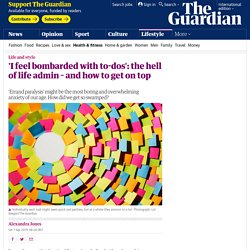
“What are you doing?” I asked as he tapped at his computer. Eyes down, he replied, “I’m taking you off the flight.” “But... but…” I stuttered. He handed my passport back. I was 18, in Schiphol airport, Amsterdam, not boarding the second half of my flight to Delhi.
You Don’t Have A Time Management Problem — You Just Think You Do. Why Time Management Is Ruining Our Lives. Getty Images The eternal human struggle to live meaningfully in the face of inevitable death entered its newest phase one Monday in the summer of 2007, when employees of Google gathered to hear a talk by a writer and self-avowed geek named Merlin Mann.
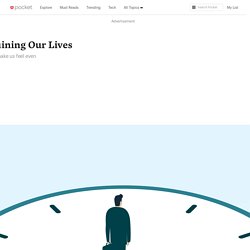
Their biggest professional problem was email, the digital blight that was colonising more and more of their hours, squeezing out time for more important work, or for having a life. And Mann, a rising star of the “personal productivity” movement, seemed like he might have found the answer. He called his system “Inbox Zero”, and the basic idea was simple enough. Most of us get into bad habits with email: we check our messages every few minutes, read them and feel vaguely stressed about them, but take little or no action, so they pile up into an even more stress-inducing heap.
Redirect?&url= Everything should take 20 minutes. Think about a task you wish to or must complete, and imagine how long it should take you.
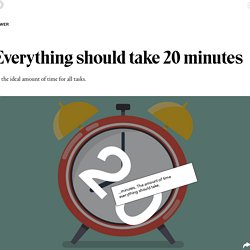
If you are a right-thinking person like myself, the answer is “20 minutes.” A 10-minute task is hardly a task at all, more of a minor interruption, and anything that takes 30 minutes invites the thought that you could have watched a half-hour episode of television instead. Twenty minutes is, objectively, the ideal amount of time — the Goldilocks number when it comes to doing things. The Best Investment Decision I Have Ever Made - Darius Foroux - Pocket. When I got my business degree in 2011, I was ready to start my career.

I wanted to start a business, earn money, and also invest. Those were my main priorities for the past seven years. Feeling Busy and Distracted? It’s Not Your Fault - Make Time - Pocket. But you are the only one who can fix it.
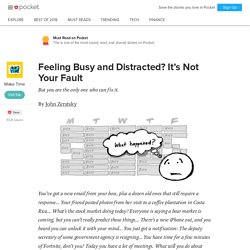
You’ve got a new email from your boss, plus a dozen old ones that still require a response… Your friend posted photos from her visit to a coffee plantation in Costa Rica… What’s the stock market doing today? Why You Should Stop Reading News. Feeling Busy and Distracted? It’s Not Your Fault - Make Time - Pocket. How to Get Your To-Do List Done When You’re Always in Meetings. Stop Wasting Your Hard-Earned Free Time - Darius Foroux - Pocket. Please answer me this: Why do we work 8–9 hours a day so that we can earn free time, while we endlessly waste that hard-earned free time?
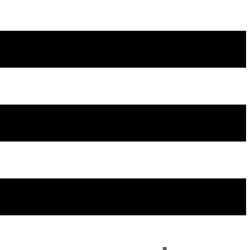
Have you ever looked at it this way? It’s an absurd way of living. And yet, everyone with a traditional job lives that way. How to get better at estimating your time. This Morning Routine Will Save You 20+ Hours Per Week - Benjamin P. Hardy - Pocket. The traditional 9–5 workday is poorly structured for high productivity.

Perhaps when most work was physical labor, but not in the knowledge working world we now live in. Although this may be obvious based on people’s mediocre performance, addiction to stimulants, lack of engagement, and the fact that most people hate their jobs — now there’s loads of scientific evidence you can’t ignore. The Myth of the 8 Hour Workday The most productive countries in the world do not work 8 hours per day. Actually, the most productive countries have the shortest workdays. People in countries like Luxembourg are working approximately 30 hours per week (approximately 6 hours per day, 5 days per week) and making more money on average than people working longer workweeks.
This is the average person in those countries. How Much Free Time Do the Happiest People Have? The correlation that Holmes and her collaborators hit upon persisted even after they controlled for people’s age, gender, race, parental status, and other demographic variables (though they did not calculate how the optimal amount of free time varied depending on these factors).
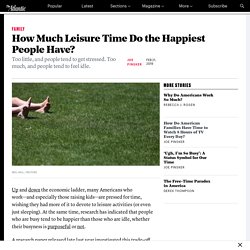
The researchers write that their finding is a “small” effect, but still significant, considering that “there are a slew of other variables that play into people’s overall assessment of their satisfaction in life.” An experiment that the researchers arranged hinted at a possible explanation of the correlation they found. They asked participants to picture and describe what it would be like to have a certain amount of daily free time, and then report how they’d feel about that allotment. “What we find is that having too little time makes people feel stressed, and maybe that’s obvious,” says Holmes. “But interestingly, that effect goes away—the role of stress goes away—once you approach the optimal point.”
Why Calendars are More Effective Than To Do Lists - Srinivas Rao - Pocket. If there’s one pattern I’ve come across in dozens of articles, books I’ve read, and the 100’s of people that I’ve interviewed, it’s that the most prolific, productive and successful ones don’t depend on to-do lists, they depend on a calendar.
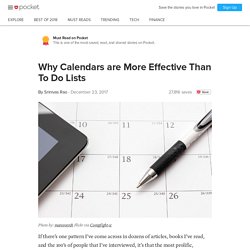
It’s a lesson I’ve learned over and over again in my own work. The likelihood of me getting anything done goes up significantly when I put something on the calendar. Our lives are dictated almost entirely by units of time: Publishers give authors deadlinesProfessors give students a syllabus with important datesGoogle maps gives you an estimated time for how long it will take to get to your destinationWhen you get your car repaired, they tell you what time it will be ready.When you ship something you are told how long it will take to get to the recipient. Who Killed the Weekend? - The Guardian - Pocket. I was a weird kid, and so my childhood weekends were often a bit weird, because our weekends reveal us as we really are. I liked to read in strange places: the stairs of the local church, or by the bins in the lane.
I once spent a Saturday writing a musical based on a Blondie album, and a Sunday conscripting my grumpy friends into performing. I went to the movies and read my handwritten reviews of Ghostbusters and The Outsiders into a tape recorder, doling out star ratings. My parents were loving and around, but faintly, until Sunday dinner in the dining room.
The weekends were open, rambling, and alight with possibility. When my own son, then aged 12, started asking on Sunday nights, “Was that a weekend? How did my son end up as unfamiliar with the concept of the weekend as the Dowager Countess in Downton Abbey? The number of people working more than 48 hours a week rose by 15% between 2010 and 2015, according to the TUC, a trend tagged “Burnout Britain”. Stop Wasting Your Hard-Earned Free Time - Darius Foroux - Pocket. Wake Up Earlier Tips Better Sleep Tricks. From "set your alarm on the other side of the room" to "invest in a coffee pot with a timer," you’ve probably heard a million don’t-hit-snooze tips before. But, unless you're a true morning person, getting up even one hour earlier than usual can feel impossible.
That’s largely because early birds and night owls (what is it with birds and circadian clocks, anyway?) Have inherently different time settings, says Michael Terman, PhD, professor of clinical psychology at Columbia University and co-author of Reset Your Inner Clock. A clump of neurons located in the suprachiasmatic nucleus (SCN) region of your brain’s hypothalamus functions as your body’s timepiece, telling it when to be awake or asleep. And, while your default settings are believed to be largely genetic, you can reset them with a little effort — which is far easier than going through life on a half-empty sleep tank. Productivity Tips for People Who Hate Productivity Tips - Harvard Business Review - Pocket. “Traditional approaches to staying focused don’t work for me.” “I know what I should do to be more productive, but I just don’t do it.”
I hear sentences like these repeatedly from coaching clients. Many have read articles and books — and have even been trained in productivity methods — but still find staying focused to be an uphill battle. The truth about time management: how I went from chaos to punctual calm in one week. You can’t take advice from someone too different from you. You would feel like a dog learning how to be a cat. I might have engaged politely with Julie Morgenstern’s time-management advice – spelled out in various books over the years, including this year’s parenting opus, Time to Parent – but I wouldn’t really have been listening with my whole spirit if the life she described, before her conversion to efficiency, had not been so recognisable.
It was like looking in a bloody mirror. “For the first quarter-century of life, I lived in chaos,” she says. “I lived out of piles. Willpower Doesn’t Work. Here’s the Key to Being More Productive According to Neuroscience. I used to believe that being more productive meant getting more done. That my personal productivity was defined by the sheer volume of tasks that I managed to take down each day. And then one day, tired, exhausted, in a fit of rage that included heavy cursing and the belligerent kicking of stuffed animals (I happened to be in my young niece’s bedroom at the time) I experienced somewhat of an epiphany. I shouldn’t define productivity by the total volume of tasks I manage to accomplish. After all, do I really care, at the end of the day, how many activities I get to cross off my list of to-dos? What I should care about, I reasoned to myself, is what those activities promise to earn me.
And so right then and there, I decided to begin measuring my productivity using another metric. When I came to measure productivity in this way, it became immediately apparent that not all activities were created equal. Maintenance vs Growth Maintenance activities are effectively short-term obligations. The Downside of Work-Life Balance - James Clear - Pocket.
An Argument for Waking Up Crazy Early. Good morning Photo: Andy Sacks/Getty Images. Rewire your brain to beat procrastination – Taking Note. Redirect?&url=
Mental Models and Making Decisions You Don't Regret. Capital - Why time management so often fails.